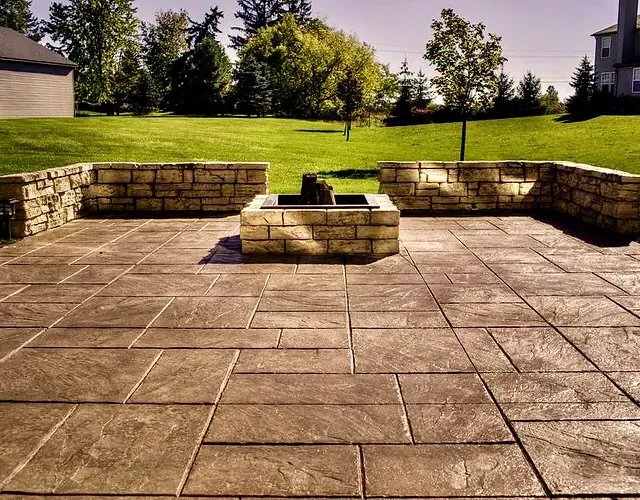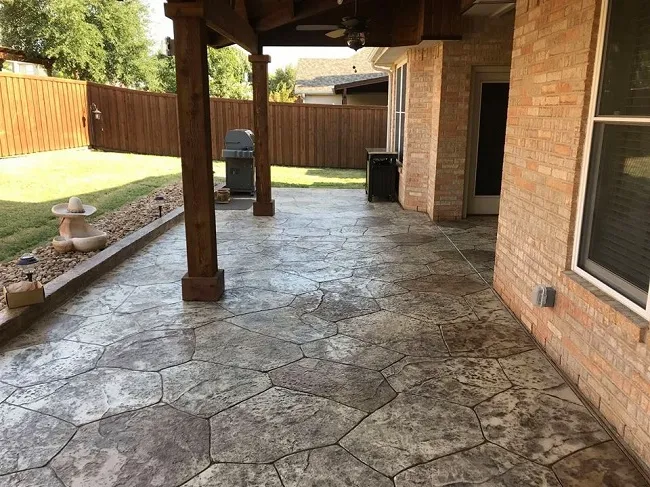Available Now
How to Clean a Concrete Driveway With Bleach

To clean a concrete driveway with bleach: mix 1 part bleach with 1 part water, wet the driveway, apply the bleach, wait 10-15 mins, scrub with a brush, rinse well, and wear safety gear. Dispose of bleach safely and consider eco-friendly options such as
natural stain removal techniques.
· Curb Appeal and Safety: A clean driveway enhances curb appeal and reduces slip hazards, making it safer for you and your guests. Moreover, periodic cleaning can increase the life of your driveway. If you're considering installing a new driveway, understanding concrete driveway options and costs can help in making an informed decision.
· Proper Dilution: Always dilute bleach with water in a 1:1 ratio to prevent damage to your driveway and ensure safety during use. If you're unsure about the cleaning process, this detailed guide can provide insights into cleaning your driveway without harming the surrounding vegetation.
· Effective Scrubbing: Using a stiff brush in a back-and-forth motion with downward pressure is the most effective technique for cleaning stains and grime. For tougher stains like oil, you might need specific methods to remove oil from concrete driveways.
· Thorough Rinsing: Rinse your driveway thoroughly with clean water to remove all traces of bleach and prevent potential damage.
· Environmental Responsibility: It's essential to be environmentally conscious while cleaning. Dispose of bleach and debris responsibly to minimize the environmental impact and protect our ecosystems. If you're keen on exploring more about driveway maintenance and care, the official website offers a plethora of information.
When it comes to home maintenance, one area that often gets overlooked is the driveway. Yet, keeping your driveway clean is not just about aesthetics; it's also about preserving its longevity and preventing potential hazards. Over time, concrete driveways can accumulate dirt, grime, and unsightly stains that can be quite challenging to remove. In this comprehensive guide, I'll walk you through the process of cleaning your concrete driveway using bleach, a powerful and effective cleaning solution.
The Importance of Driveway Cleanliness
A clean driveway significantly boosts your home's curb appeal. It's one of the first things visitors and potential buyers notice, creating a positive first impression. But curb appeal is just the beginning; there are many more reasons to keep your driveway clean:
· Preventing Weed Growth: Regular cleaning and maintenance help prevent weed growth through cracks and crevices in your driveway, reducing the need for weed killers.
· Safety First: Clean driveways are less slippery, reducing the risk of accidents and falls, especially in wet or icy conditions.
· Prolonged Lifespan: Cleaning removes dirt, oil, and debris that can deteriorate the surface of your driveway. Regular maintenance can extend its lifespan.
· Environmental Impact: Properly disposing of driveway debris and pollutants instead of letting them wash into storm drains contributes to a cleaner environment.
Now, let's explore how you can effectively clean your concrete driveway using bleach as a cleaning solution.
Materials and Safety Precautions

Materials Needed
Before you begin the cleaning process, gather the following materials:
· Bleach: You'll need regular household bleach, not a super-concentrated industrial version.
· Water: For diluting the bleach.
· Bristle Brush or Broom: A stiff-bristle brush is essential for scrubbing the concrete.
· Safety Gear: Wear gloves and eye protection to ensure your safety.
· Protective Clothing: Put on old clothes and closed-toe shoes to avoid bleach splashes.
· Bucket: Use it to mix your bleach solution.
· Hose or Pressure Washer: You'll need this to rinse off the bleach and dirt.
Safety Precautions
Safety should always be your top priority when working with bleach. Here are some crucial safety precautions to follow:
· Ventilation: Work in a well-ventilated area to avoid inhaling bleach fumes.
· Gloves and Eye Protection: Wear chemical-resistant gloves and safety goggles to protect your skin and eyes.
· Protective Clothing: Don't wear your favorite clothes; opt for old ones that you won't mind getting bleach stains on.
· Avoid Contact: Keep bleach away from your skin, eyes, and mucous membranes.
· Keep Pets and Children Away: Ensure that pets and children stay clear of the cleaning area.
· Dispose of Bleach Safely: Dispose of any leftover bleach solution properly and in accordance with local regulations.
Preparing the Bleach Solution

Once you've gathered your materials and put on your safety gear, it's time to prepare the bleach solution. Proper dilution is crucial to ensure effective cleaning without causing damage. Here's how to do it:
· Mixing Ratio: Dilute the bleach with water in a 1:1 ratio. That means equal parts bleach and water. This ratio strikes the right balance between cleaning power and safety for your concrete driveway.
· Use a Bucket: Pour the bleach and water into a bucket and mix them thoroughly. Avoid splashing during this step.
· Label the Solution: It's a good practice to label the bucket clearly as "Bleach Solution" to prevent accidental misuse.
Applying the Bleach Solution
With the bleach solution ready, you can now proceed to apply it to your driveway. Follow these steps for even application:
· Pre-wet the Driveway: Before applying the bleach solution, give your driveway a good pre-wet with plain water. This helps prevent the bleach from soaking into the concrete too quickly, reducing the risk of potential damage. It also loosens the initial layer of dirt and grime.
· Spray Evenly: Use a sprayer or a watering can to evenly spread the bleach solution over the entire driveway. Ensure uniform coverage, but be cautious not to oversaturate any area, as this can lead to unnecessary damage.
· Wait for 10 Minutes: After applying the bleach solution, allow it to sit for about 10 minutes. This waiting period lets the bleach work its magic, breaking down the dirt and stains.
Scrubbing and Cleaning
Now that the bleach solution has had time to work, it's time to roll up your sleeves and get scrubbing:
· Use a Stiff Brush: Take your stiff-bristle brush or broom and start scrubbing the driveway. Pay extra attention to any stubborn stains or dark spots. The scrubbing action will help dislodge dirt and grime.
· Effective Technique: To clean effectively, use a back-and-forth motion while applying downward pressure. This technique ensures that you cover the entire surface and target stains effectively.
Rinsing the Driveway
Cleaning the driveway isn't just about applying bleach; it's equally important to rinse it thoroughly to remove all traces of bleach and dirt:
· Use a Hose or Pressure Washer: Rinse the driveway thoroughly with clean water using a hose or a pressure washer. Start from one end and work your way to the other, ensuring complete coverage.
· Check for Residue: Keep rinsing until the water runs clear, indicating that no bleach residue remains. This step is essential to prevent any potential damage or hazards.
Safety and Environmental Considerations
While bleach is an effective cleaning solution, it's essential to be aware of potential hazards and consider the environment:
Potential Hazards of Using Bleach
· Skin and Eye Irritation: Bleach can cause skin and eye irritation. Always wear protective gear as mentioned earlier.
· Toxic Fumes: Bleach produces toxic fumes when mixed with other chemicals. Never mix bleach with ammonia or any other cleaning products.
· Environmental Impact: Properly disposing of bleach solutions and pollutants instead of letting them wash into storm drains contributes to a cleaner environment.
Environmentally Responsible Cleaning
If you're concerned about the environmental impact of using bleach, consider these tips for more eco-friendly cleaning:
· Biodegradable Cleaners: Look for biodegradable concrete cleaners that are less harmful to the environment.
· Capture and Dispose: If possible, capture and dispose of the rinse water responsibly to prevent it from entering stormwater systems.
Alternatives to Bleach
While bleach is highly effective, some may prefer alternative cleaning solutions. Here are a few options:
· Vinegar: A mixture of vinegar and water can be used to clean concrete, although it may not be as potent as bleach.
· Pressure Washing: Consider using a pressure washer with just water to remove dirt and stains.
Additional Tips for Driveway Maintenance

To keep your driveway clean and well-maintained, consider these additional tips:
· Regular Cleaning: Perform routine cleanings to prevent dirt and stains from accumulating.
· Sealing: Consider applying a concrete sealer to protect your driveway from future stains and damage.
· Weed Control: Remove weeds and grass that may grow through cracks in the concrete to maintain a smooth surface.
Conclusion
Cleaning your concrete driveway with bleach can be a highly effective way to rejuvenate its appearance and prolong its lifespan. By following the steps outlined in this guide and taking the necessary safety precautions, you can achieve impressive results. Remember to be environmentally responsible in your cleaning efforts, and explore alternative methods if you prefer a more eco-friendly approach. A clean driveway not only enhances your home's curb appeal but also ensures safety and durability for years to come.
Additional Resources and References
In our quest to provide you with the most comprehensive guide on cleaning concrete driveways with bleach, we've gathered valuable resources and references. These sources offer further insights, tips, and expert advice to ensure your driveway cleaning endeavor is both effective and safe. Delve into these references to enhance your knowledge and achieve exceptional results in maintaining your concrete driveway's pristine condition.
https://mary-catherinerd.com/how-to-clean-concrete-driveway-with-bleach/
https://blog.nationwide.com/home/home-maintenance/driveway-concrete-repairs-and-tips/
FAQ
Will bleach damage my concrete driveway?
Bleach, when used in the recommended 1:1 ratio with water and proper safety precautions, is unlikely to damage your concrete driveway. It can actually help preserve its appearance and longevity.
Do I need to rinse bleach off my concrete driveway?
Yes, it's crucial to rinse bleach off your concrete driveway thoroughly. Failing to do so can result in residual bleach, which may lead to damage or pose safety hazards.
What is the ratio of bleach to water for cleaning a concrete driveway?
The recommended ratio is 1 part bleach to 1 part water. This balanced mixture is effective for cleaning without causing excessive harm to the concrete.
Is bleach or vinegar better for cleaning concrete driveways?
Bleach is generally more effective for tough stains and mold removal. Vinegar can be used for regular maintenance but may not be as potent as bleach.
Are there any eco-friendly alternatives to bleach for driveway cleaning?
Yes, you can opt for biodegradable concrete cleaners or explore alternative methods that have a lower environmental impact.
GET IN TOUCH
Need more information? Speak to one of our experts and get personalised advice on your project to bring your vision to life. Contact us today to schedule your consultation or request a free consultation.
Contact Us
Thank you for submitting a quote request. We'll get back to you shortly!
Oops, there was an error in sending your message.
Please try again later.
YOU MIGHT ALSO LIKE...
YOU MIGHT ALSO LIKE...



Call Now For a Fast & Free Quote
We can be contacted 24/7 via email or telephone
Location
City Council of Ballarat and Surrounding Areas
Call
Ballarat's Best Concreters since 2010.
This is a referral website, please visit our Privacy Policy for more information.
Navigation
Services
Working hours
- Mon - Sun
- -
Give us a call and if we cannot get to you straight away, one of our specialist will call you back shortly.
All Rights Reserved | JM Ballarat Concreters
New Paragraph


